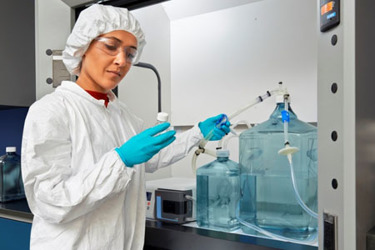Identify The Right Level Of Clean For Your Process

Within bioproduction facilities, different applications carry various levels of risk, and require different levels of cleanliness and validation. A sterility level of 10–6 has become an industry standard, however, Thermo Fisher Scientific is going beyond this to help ensure that USP <788> standards are met and even exceeded, in addition to complying with USP <30> and USP <85> standards. Implementing the correct level of clean to meet the needs of an application can help manage batch quality, ensure regulatory requirements are met, and improve the overall efficiency of the entire pipeline.
Deciding which rigid containment products to use can be a complex decision. When selecting a container that comes into direct contact with the biopharmaceutical product, resins, contact surfaces, and container parameters need to be considered. It’s crucial to define the cleanliness needs of the application and source containers that match those needs—for example, sensitive biopharmaceutical drug substances require the cleanest contact surfaces, so the containers used for these applications should have various certifications, very low particulate levels, and validated sterility.
This eBook is designed to offer an overview about clean containers and process requirements beyond sterility to professionals in quality department, project managers, and procurement managers.
Read on to find out why understanding different levels of container cleanliness is key to successful bioproduction workflows, and how a collaborative relationship with a trusted vendor can help to optimize output quality and streamline processes.
Get unlimited access to:
Enter your credentials below to log in. Not yet a member of Bioprocess Online? Subscribe today.
